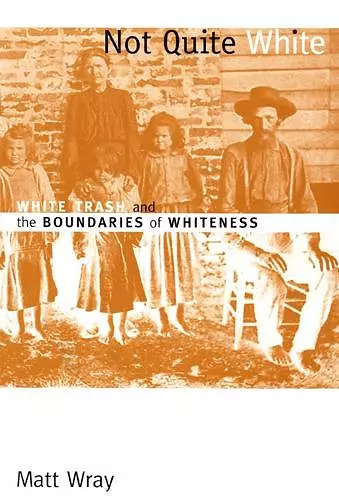Not Quite White
White Trash and the Boundaries of Whiteness
Format:Hardback
Publisher:Duke University Press
Published:3rd Nov '06
Currently unavailable, and unfortunately no date known when it will be back

Study of the historical development of the category "white trash" in American culture.
Analyzes the origins of the derogatory phrase "white trash" by documenting the meanings projected on to poor rural whites in the U.S. from the early 1700s through the early 1900s.White trash. The phrase conjures up images of dirty rural folk who are poor, ignorant, violent, and incestuous. But where did this stigmatizing phrase come from? And why do these stereotypes persist? Matt Wray answers these and other questions by delving into the long history behind this term of abuse and others like it. Ranging from the early 1700s to the early 1900s, Not Quite White documents the origins and transformations of the multiple meanings projected onto poor rural whites in the United States. Wray draws on a wide variety of primary sources—literary texts, folklore, diaries and journals, medical and scientific articles, social scientific analyses—to construct a dense archive of changing collective representations of poor whites.
Of crucial importance are the ideas about poor whites that circulated through early-twentieth-century public health campaigns, such as hookworm eradication and eugenic reforms. In these crusades, impoverished whites, particularly but not exclusively in the American South, were targeted for interventions by sanitarians who viewed them as “filthy, lazy crackers” in need of racial uplift and by eugenicists who viewed them as a “feebleminded menace” to the white race, threats that needed to be confined and involuntarily sterilized.
Part historical inquiry and part sociological investigation, Not Quite White demonstrates the power of social categories and boundaries to shape social relationships and institutions, to invent groups where none exist, and to influence policies and legislation that end up harming the very people they aim to help. It illuminates not only the cultural significance and consequences of poor white stereotypes but also how dominant whites exploited and expanded these stereotypes to bolster and defend their own fragile claims to whiteness.
“Matt Wray’s Not Quite White is a richly textured social history of how and why the nation has come to conceive, categorize, and routinely vilify that part of its population known as ‘white trash.’ Because this subject has rarely been the focus of systematic scholarly inquiry, that alone would be a notable achievement. Yet the book aims for more—to propose a boundary theory of why ‘white trash’ has had so many uses—from literature to politics to social science. By any measure, this book is a major contribution.”—Troy Duster, New York University
“White trash? What did you just call me? Not Quite White provides the best social history of America’s most quizzical moniker in the racial-class system. From its colonial origins to the era of eugenics to the public health campaign to eradicate hookworm in the South, Matt Wray’s careful analysis documents the roots of this label, showing what its apparently oxymoronic nature tells us about the larger system of symbolic stratification in the United States.”—Dalton Conley, author of Honky
“[A]n engaging study. . . . the book is the result of ambitious interdisciplinary research examining multileveled, interactive processes of social differentiation in distinct historical periods. . . . Wray’s work adds new depth to our understanding of the intraracial dynamics that construct and sustain ideologies of white supremacy and will challenge scholars to rethink their own constructs of what white means. Both the substance and methodology of this work will be of interest to professionals and graduate students in the social sciences and humanities. Selected chapters might also serve well in upper-division undergraduate courses.” -- Pamela Perry * American Journal of Sociology *
“Matt Wray’s latest book, Not Quite White: White Trash and the Boundaries of Whiteness, is a compelling read. The prose is lucid and the analysis, which draws upon boundary theory and poststructuralist methods, most insightful. . . . [A] beautifully crafted, detailed and fascinating account.” -- Anoop Nayak * Ethnic and Racial Studies *
“The length of the book and an easily readable narrative style make it well suited for the undergraduate classroom. Students will find the book accessible; educators should appreciate its potential to stimulate thought-provoking discussion. . . . [T]his is a well-argued and thought-provoking book. It complicates scholarly understandings of what it has meant to be ‘white’ and succeeds as a model of interdisciplinarity.” -- David J. LaVigne * Journal of Social History *
“Wray’s new book, Not Quite White, is a brilliant and original monograph that both expands and challenges Whiteness Studies, which tend to deal with an undifferentiated white ethnicity; Ethnic Studies, which largely omit class analysis; and Labor Studies, which are not interested in the phenomenon of poor whites . . . . The text is accessible to non-specialists and undergraduates along with scholars and graduate students. This would be a fine textbook for any number of courses.” -- Roxanne Dunbar-Ortiz * Journal of American Ethnic History *
ISBN: 9780822338826
Dimensions: unknown
Weight: 472g
232 pages